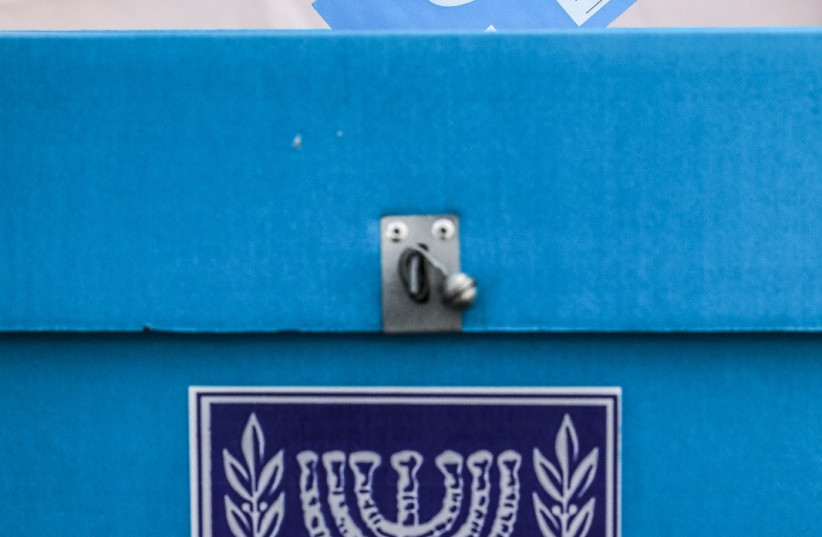Millions of Israelis will head to the ballot booths today for the fifth time since April 2019 and choose their representatives for Israel’s 25th Knesset, hoping for an end to the political instability that has plagued the country for the past three years.
There are 6,788,804 Israelis that are eligible to vote, over 200,000 more than in the previous election in March 2021. Votes will be cast in 12,495 ballot boxes, including special booths in hospitals, jails and old age homes.
The 2021 election had a 67.4% voter turnout, the lowest since 2009. Since 1999, voting percentages have passed 70% only three times – in 1999 (78.7%), 2015 (72.3%) and 2020 (71.5%).
The political instability over the past three-and-a-half years has led to growing dismay about the state of Israel’s democracy. According to data published by the Israel Democracy Institute (IDI) last week, 56% of Israelis expressed trust in the upcoming election, but 39% said they question if the results “precisely reflect how the public voted.” In addition, only 37% of Israelis are optimistic about the future of Israel’s democratic rule.
Some 39 parties are running in today’s election, out of which 13 were represented in the 24th Knesset – almost all of which are polled to return individually or as part of a faction, except for the Jewish Home Party and Balad.

Three party leaders are also vying to become Israel’s next prime minister: current Prime Minister Yair Lapid of Yesh Atid, opposition leader and former prime minister MK Benjamin Netanyahu of the Likud, and Defense Minister Benny Gantz, leader of the National Unity Party.
Lapid took over the position from former prime minister Naftali Bennett on June 30 after the Knesset dispersed, in accordance with the rotation agreement the two signed in June last year. That agreement ended Netanyahu’s 12-year rule as prime minister after his rotation government with Gantz collapsed.
ISRAEL'S RIGHT-WING bloc hopes to bring Netanyahu back as prime minister, in a coalition backed by the Religious Zionist Party led by MKs Bezalel Smotrich and his number two, Otzma Yehudit faction leader MK Itamar Ben-Gvir, and by the two haredi (ultra-Orthodox) parties: United Torah Judaism led by Yitzhak Goldknopf and MK Moshe Gafni, and Shas, led by Aryeh Deri. Habayit Hayehudi (Jewish Home), led by Interior Minister Ayelet Shaked, also pledged its support for Netanyahu, but may not pass the electoral threshold of 3.25% of the general vote.
Israel's Center, Left and Arab parties are vying for a broad coalition led either by Lapid or Gantz. All of these parties, which include Yesh Atid, National Unity, Yisrael Beytenu, Labor, Meretz, Ra'am, Hadash Ta'al and Balad, pledged that they would not join Netanyahu or Religious Zionism in any government. Instead, these parties are attempting to form a coalition similar to the previous one. This would include Ra'am, which was the first Israeli Arab party ever to join a coalition but also would entail attempting to draw parties from the other side – especially the haredi parties.
Lapid trying to galvanize supporters
Lapid, in a final meeting with his party on Monday, tried to galvanize his supporters.
“I never believed that Israel was divided between ‘us’ and ‘them,’” Lapid said. “We all love the country, we are all patriots and Zionists, and want to live here together.”
"We all love the country, we are all patriots and Zionists and want to live here together."
Prime Minister Yair Lapid
“All Israelis – Right and Left, Likudniks and Yesh Atidniks – deserve the most basic thing: a government of fair and hard-working people, who will work hard for them,” Lapid said.
Netanyahu's emergency meeting
Netanyahu on Monday evening gathered an “emergency meeting” in which he warned that voting percentages amongst his opponents were growing, and called on his allies to spur on the vote on Election Day in order to get as many voters out as possible.
Gantz last-minute campaigning
Gantz in a last-minute video tried to appeal to right-wing voters who were still deliberating between National Unity and Jewish Home. In the video, he is seen explaining to National Unity’s national-religious candidates Matan Kahana and Sports and Culture Minister Chili Tropper that as defense minister, he had been attentive to the needs of Israel’s settlements and that he had approved construction in Judea and Samaria. Gantz’s opponents, mainly Ben-Gvir and Smotrich, have accused him of doing the opposite and allowing unrestricted Palestinian construction in Area C.
Gantz also attacked Netanyahu, who accused him of approving a recent operation in Nablus for political purposes.
“He [Netanyahu] is appealing to the lowest emotions of people who have no knowledge of the matter,” Gantz said. “Is this how a national leader behaves? This is a disgrace, and I hope that the Israeli public understands that it is dealing with a liar who spins every story for his own personal gain.”
